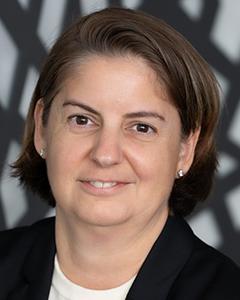Plastic deposit: “A step in the right direction”

20 December, 2024
From January 2025, a deposit on plastic bottles and beverage cans in Austria will ensure more recycling and less waste. UAS-experts Martina Ortbauer and Elisabeth Simböck talk about the opportunities and challenges.
On January 1, 2025, the new deposit system for disposable drinks bottles and cans will start in Austria: a deposit of 25 cents per plastic bottle and drinks can is intended to increase the collection rate and strengthen the circular economy. Martina Ortbauer (head of the master’s program in Ecotoxicology and Environmental Management) and Elisabeth Simböck (head of the City of Vienna Competence Team for Teaching Microplastics and Nanoparticles as Environmental Risks) welcome this step and shed light on the opportunities and challenges of this system.

Program Director Master Environmental Management & Ecotoxicology

Head of Competence Center Chemical Engineering & Biomaterials
Senior Lecturer/Researcher
“A step in the right direction”
The new deposit system that will be in place in Austria from 2025 brings an important change: a deposit of 25 cents will be charged for all closed plastic and metal packaging from 0.1 to 3 liters. If you return it properly, you get the money back. “This is a step in the right direction to increase high-quality recycling rates and promote a closed recycling loop,” explains Martina Ortbauer. She adds that this also helps to reduce microplastic pollution. The deposit system is particularly important for the circular economy. “It shows that plastic is a valuable raw material that can be reused,” says Elisabeth Simböck, Lecturer / Researcher in the field of Chemical Engineering and Ecotoxicology at the University of Applied Sciences Technikum Wien. By returning plastic bottles in a single-variety manner, not only is the recycling rate increased, but the consumption of fossil petroleum resources for plastic production is also reduced.
“All kinds of things are thrown into the yellow bin, which leads to logistical and financial challenges.”
According to Simböck, the new deposit system makes consumers more aware “that plastic is an important material and can be recycled, and the deposit is an incentive to do so correctly”. According to Simböck, plastic recycling has been well implemented so far through the yellow bin, “but all sorts of things are thrown into it, which leads to further logistical and financial challenges. “The goal of the measure is clear: a collection rate of 90 percent is to be achieved by 2027. “We Austrians may not be the most diligent when it comes to returning items, but the deposit is a strong incentive. In addition, the yellow sack is likely to improve the situation,” says Ortbauer. The new plastic deposit also presents some new challenges: Bottles and cans must be returned undamaged, which can be particularly troublesome for people without a car. This may possibly lead to a reduction in consumption, hopes Ortbauer: “Perhaps it will stop some people from buying so many plastic bottles and cans.”
Deposit system does not solve the problem of plastic overproduction
Simböck emphasizes that the deposit system does not solve the overproduction of plastic, but it is an important start: “Although it only combats one symptom, it enables targeted recycling and reduces the need for new plastic resources.” She also sees potential for expanding the system to other product categories such as textiles or electronics: “This would raise awareness of the value of resources and lead us away from a throwaway society.” “The new deposit system in Austria certainly doesn’t solve all of the problems, but measures like this send a strong signal for a more sustainable use of resources. Ortbauer and Simböck see the introduction of the plastic deposit as a necessary impetus to raise consumer awareness and promote recycling.
Further Links:
Faculty of Life Science Engineering
Master’s program in Ecotoxicology and Environmental Management
City of Vienna Teaching Competence Team Microplastics and nanoparticles as environmental risks